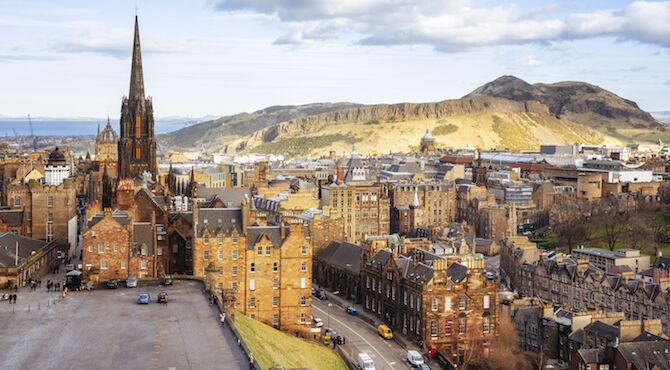Affordability key to house price rises in UK cities
New data has found that UK house prices are at their highest since September 2017 – with affordability being an important factor in healthy price growth.

 30 January 2020
30 January 2020Strong house price growth in the North of England
Zoopla found that annual house price growth across the 20 cities averaged 3.9 per cent last year, representing the strongest growth since September 2017.The Zoopla report also predicted which cities were likely to see the healthiest price growth in 2020. Taking into account factors such as affordability, availability and the differences between asking and accepted prices, the company predicted Nottingham would have the strongest growth this year, followed by Edinburgh, Glasgow and Manchester."In contrast, we expect cities in southern England to register below-average price growth as affordability levels realign to what buyers can afford," says Richard Donnell, research and insight director at Zoopla. "Overall, we are expecting house prices to grow on average by 3 per cent across all UK cities in 2020."Largely as a result of these affordability factors, the report forecast more constrained price growth in South of England conurbations such as Bournemouth, Southampton, London and Oxford. In London, Zoopla said it expected sales volumes to pick up faster than prices this year.Brexit uncertainty slowed pace of growth
Meanwhile, Nationwide reported that, in January, annual house price growth across the country rose by 1.9 per cent – the strongest growth since November 2018.Robert Gardner, Nationwide's chief economist, says "modest" price growth in both January and December followed 12 successive months in which annual rises had been below one per cent."Indicators of UK economic activity were fairly volatile for much of 2019, but the underlying pace of growth slowed through the year as a result of weaker global growth and intensification of Brexit uncertainty," Mr Gardner says.Read more property news:
"Recent data continues to paint a mixed picture. Economic growth appeared to grind to a halt as 2019 drew to a close, though business surveys point to a pick-up at the start of the new year,” Mr Gardner adds."The underlying pace of housing market activity has remained broadly stable, with the number of mortgages approved for house purchase continuing within the fairly narrow range prevailing over the past two years."
An ‘ignited’ housing market
Jonathan Hopper, managing director of Garrington Property Finders, says, “January is usually a busy time for estate agents as would-be buyers begin their search in earnest. But this year their numbers have been swelled by thousands of people who sat on their hands as Brexit uncertainty swirled.“Sellers, too, are returning to the fold, meaning the market is seeing a simultaneous uplift in both demand and supply. Only when the dust settles will we know for certain how that double stimulus affects prices."Lucy Pendleton, founder-director of estate agents James Pendleton, adds that the housing market has "ignited" following last month's general election. “This index lands two days after UK Finance also revealed that home buyer mortgages were up 24 per cent annually in December, so Britons look to be on the move.“January usually marks a return of listings and viewings after the Christmas break. On London’s doorsteps, this has been manifesting itself with increased interest from foreign buyers and investors and, more importantly, a return of enthusiasm to move among domestic consumers. More footfall, more listings, more viewings and more offers over asking price have all marked out this month as the strongest start to any year this century.”Zoopla index showing average prices and percentage rises in 20 cities over 2019:
- Edinburgh, £242,200, 6.1%
- Nottingham, £159,600, 5.2%
- Leicester, £181,000, 4.7%
- Manchester, £173,700, 4.5%
- Liverpool, £122,600, 4.1%
- Birmingham, £167,500, 3.9%
- Belfast, £138,500, 3.7%
- Leeds, £169,100, 3.6%
- Glasgow, £124,600, 3.4%
- Bristol, £285,300, 3.2%
- Sheffield, £139,800, 3.1%
- Bournemouth, £291,200, 3.0%
- Cardiff, £210,800, 2.8%
- London, £480,800, 1.9%
- Portsmouth, £240,500, 1.9%
- Cambridge, £410,300, 1.6%
- Newcastle, £128,500, 1.5%
- Southampton, £226,500, 0.6%
- Oxford, £413,600, minus 0.1%
- Aberdeen, £155,700, minus 3.1%
Read more news and views from David Sapsted.
Subscribe to Relocate Extra, our monthly newsletter, to get all the latest international assignments and global mobility news.Relocate’s new Global Mobility Toolkit provides free information, practical advice and support for HR, global mobility managers and global teams operating overseas. Access hundreds of global services and suppliers in our Online Directory
Access hundreds of global services and suppliers in our Online Directory
©2025 Re:locate magazine, published by Profile Locations, Spray Hill, Hastings Road, Lamberhurst, Kent TN3 8JB. All rights reserved. This publication (or any part thereof) may not be reproduced in any form without the prior written permission of Profile Locations. Profile Locations accepts no liability for the accuracy of the contents or any opinions expressed herein.






































